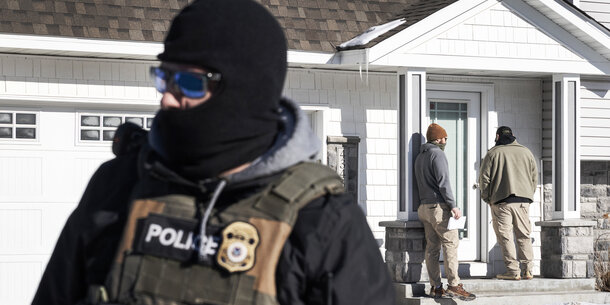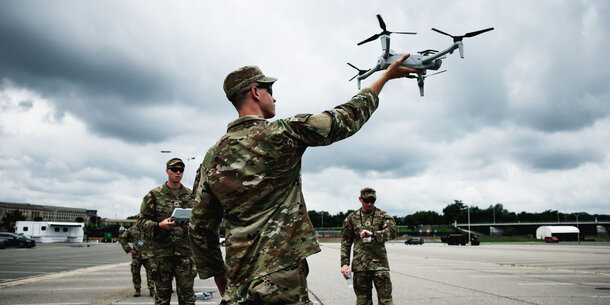Update: On June 24, 2021, the U.S. Court of Appeals for the Fourth Circuit, sitting en banc, reversed the panel decision and awarded a preliminary injunction to community activists from Leaders of a Beautiful Struggle, finding that the Baltimore Police Department’s (BPD) Aerial Investigation Research (AIR) pilot program violated the Fourth Amendment.
In the majority opinion written by Chief Judge Roger Gregory, the court held that even though the pilot program was discontinued, the Plaintiffs’ claims were not moot because some data was retained from the program. The court went on to overturn the district court’s ruling, explaining that “because the AIR program enables police to deduce from the whole of individuals’ movements, we hold that accessing its data is a search, and its warrantless operation violates the Fourth Amendment.” The opinion stated that AIR data “surpass[es] the precision even of GPS data and CSLI” as used in U.S. v. Carpenter and is “more like ‘attach[ing] an ankle monitor’ to every person in the city.”
In a separate concurrence, Chief Judge Gregory emphasized both that high rates of violent crime in certain neighborhoods of Baltimore are the product of racism and chronic underinvestment in communities, and that over-surveilling and policing those neighborhoods is an inadequate solution. We are glad to see this ruling and extension of Carpenter, and the affirmation of Americans’ right to live free from indiscriminate aerial surveillance. Read the court’s opinion here.
Background:
On April 9, 2020, the American Civil Liberties Union (ACLU) and ACLU of Maryland filed a lawsuit against the Baltimore Police Department challenging the constitutionality of the department’s Aerial Investigation Research (AIR) pilot program, a long-term, wide-area aerial surveillance program that can record the movements of virtually all of Baltimore’s residents at once. The plaintiffs for the case include Leaders of a Beautiful Struggle, a grassroots think tank advancing the public policy interests of Black people in Baltimore; Erricka Bridgeford, co-founder and co-organizer of the Baltimore Ceasefire 365 project; and Kevin James, an information-technology professional and community organizer.
In the lawsuit, the ACLU argued that the AIR program undermines the rights to privacy and free association and constitutes a search under the First and Fourth Amendments of the U.S. Constitution. The U.S. District Court for the District of Maryland disagreed, concluding that the AIR program could legally continue. Read the Court’s opinion here.
On April 30, 2020, the ACLU appealed to the U.S. Court of Appeals for the Fourth Circuit. The ACLU argued that the acquisition of location information through wide-area aerial surveillance is a Fourth Amendment search and that, contrary to the District Court’s decision, the Supreme Court’s ruling in Carpenter v. United States does implicate the AIR program, which is significantly more invasive than the other brief, targeted aerial observations permitted in the past.
On November 5, 2020, a panel of three Fourth Circuit judges handed down a divided opinion upholding the District Court’s decision. The majority found that the AIR program does not violate a reasonable expectation of privacy and is a reasonable “programmatic search” under the “special needs” doctrine. In dissent, Chief Judge Gregory explained that he would have reversed the District Court and preliminarily enjoined the AIR program. He concluded that because the AIR program does amount to long-term surveillance, effecting a Fourth Amendment search, Carpenter controls the outcome of the case.
On November 19, 2020, the plaintiffs filed a petition for rehearing en banc, asking that all 15 active circuit judges rehear the case and overturn the panel opinion.
On November 25, 2020, the Brennan Center, Electronic Frontier Foundation, Electronic Privacy Information Center, FreedomWorks Foundation, National Association of Criminal Defense Lawyers, and Rutherford Institute filed an amicus brief in support of the petition for rehearing en banc. The brief argues that a rehearing is necessary because the panel’s decision conflicts with Carpenter as well as existing Fourth Amendment precedent on the “special needs” doctrine.
Amici argue that the panel’s decision that the AIR program does not contravene Carpenter stems from the erroneous conclusion that the program cannot capture identifying characteristics of people or automobiles. In fact, as the brief presents, it is possible to “reidentify” or “deanonymize” individuals from the data collected by the AIR program. Furthermore, when coupling the aerial surveillance footage with existing datasets owned by the Baltimore Police Department, such as CCTV cameras and automated license plate readers, individual identification is almost guaranteed. The contract for the AIR program explicitly plans for integration with other surveillance datasets. The brief explains how, through its permeating, expansive, and continuous surveillance, the AIR program dramatically reduces the degree of privacy afforded to the residents of Baltimore. Surveillance technologies that collect detailed records about people’s movements, like the AIR program, infringe on individuals’ reasonable expectations of privacy under Carpenter.
The brief next lays out how the panel’s decision conflicts with a second Fourth Amendment principle: existing precedent on the “special needs” doctrine and other suspicionless searches. The panel’s alternative holding that the AIR program satisfies Fourth Amendment scrutiny under “the balancing test used for programmatic searches” is mistaken. Under the Fourth Amendment, no “balancing test” exists for programmatic searches undertaken for ordinary law enforcement purposes, like criminal investigations or prosecutions. Supreme Court precedent is clear that “warrantless searches are typically unreasonable where a search is undertaken by law enforcement officials to discover evidence of criminal wrongdoing.” The AIR program is a law enforcement investigative and crime-control tool. Thus, the “special needs” doctrine does not apply. The application of the “special needs” exception to justify a program of warrantless, suspicionless searches through Baltimore’s AIR program is a dramatic and dangerous expansion of this principle.
Lastly, amici argue that in addition to contradicting these two Fourth Amendment principles, this case exemplifies the disparate burden of government surveillance borne by communities of color. Intrusive aerial surveillance programs are often deployed in cities with large communities of color, such as Compton, California; Philadelphia, Pennsylvania; and Dayton, Ohio. The AIR program also raises serious First Amendment concerns due to its capacity to chill free speech and assembly in surveilled spaces. For all of these reasons, amici maintain that the Court should rehear the case en banc.

